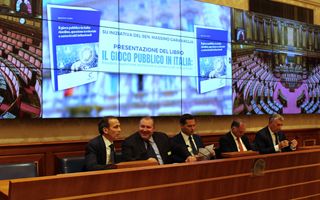(Finance) – It’s called “Public gaming in Italy: reorganization, territorial question and institutional short circuits” the book of Geronimo Cardia, presented today to the Senate thanks to the initiative of the Senator Massimo Garavaglia, President of the Finance and Treasury Commission.
At the conference, as well as Garavaglia and Cardia, several important representatives participated: Tommaso Miele, Deputy President of the Court of Auditors; Hon. Andrea De Bertoldi, Member of the Finance Commission of the Chamber; Hon. Marco Osnato, President of the Finance Commission of the Chamber (on video); Mario Lollobrigida, Director of Games of the Customs and Monopolies Agency; Emmanuele Cangianelli, President of EGP-Fipe (Confcommercio); Domenico Dtante, SAPAR President; Armando Iaccarino, President of the AS.TRO Study Center (Confindustria); Gennaro Parlati, President of ACMI.
The public gaming sector in Italy it involves various distribution verticals. The network of bars, dedicated lounges and tobacconists covers over 6,000 municipalities, guaranteeing a vast presence of legality safeguards. In 2022, the sector’s tax revenue was 11 billion euros, with 1 billion from online gaming and 10 billion from local gaming, of which 5.9 billion came from machines and slots, most affected by restrictions on distance meters and timetables. This network not only distributes state products, but ensures legality and protects users thanks to experience in the sector. The sector employs 140,000 workers out of a total of 150,000.
The book analyzes the principles of public gaming distribution and the impact of regional and municipal regulations on the national system. Cardia examines institutional developments and short circuits, proposing solutions to avoid the paralysis of public tenders for expiring concessions. This work follows the 2016 investigation entitled “The Territorial Question – The prohibition imposed on legal gaming by local legislation”.
The text provides essential tools to address the reorganization of the sector. After various incomplete attempts, such as the 2017 Agreement between the State and the Regions, the reorganization was recently started with the Fiscal Delegation of Law no. 111 of 9 August 2023, which included the distribution of the online game. The objectives are the protection of the user, lto legality, tax revenue, business and employment, maintaining a balance between concessions and stability of the system.
Garavaglia strongly reiterated the importance of establishing balanced rules to guarantee fair competition and protect companies, both Italian and foreign, large and small. He highlighted that balance is also essential between products and between online and physical gaming: “If we put in place ‘stupid’ rules we end up favoring certain companies to the detriment of others. I remember the times when I was councilor for the Economy of Lombardy Region and coordinator of the Financial Affairs commission of the Conference of Regions; Pier Paolo Baretta was the undersecretary for Economy and Finance and we were one step away from reorganization, but then everything fell apart. Now we don’t start from scratch, in fact, I would suggest start again from that basis, from the agreement reached in 2017, work on it, with the aim of arriving at a balance without hypocrisy.” Garavaglia underlined that the participation of local authorities in gaming revenue makes the reorganization of physical gaming more responsible and valorisable.
Mario Lollobrigida he criticized the distance meter for its expulsive effect and proposed maintaining reasonable distances only in relation to certain sensitive places. Tommaso Miele reiterated the importance of regulating the sector to avoid the expansion of illegal gaming. According to Miele, correct regulation is essential to guarantee economic and employment benefits.
Emmanuele Cangianelli underlined that distance meters and time restrictions are ineffective in achieving their intended objectives and generate shifts towards illegality. He stated that all companies that invest in the sector must be put in a position to continue to do so, highlighting the need for a clear political and legislative act for the implementation of the fiscal delegation.
Andrea De Bertoldi noted that gaming is one of the state’s main revenues and criticized the populist attitude that often accompanies the debate on legal gaming. He highlighted how, without a clear regulatory framework, illegal gaming thrives: “Gambling is one of the main sources of income for the State. Either we have the courage to say let’s give up the revenues from legal gaming, or it makes no sense to just engage in populism, with the the result is that illegality is toasted with champagne. History teaches us that, when legality has major limits, illegality toasts. The result is that gambling addiction grows and the State loses money.”
In conclusion, Cardia’s book and the interventions at the conference “have unanimously highlighted the urgency of reforming the public gaming sector in Italy, with a regulation that protects public and private interests, guaranteeing legality and economic stability”.
